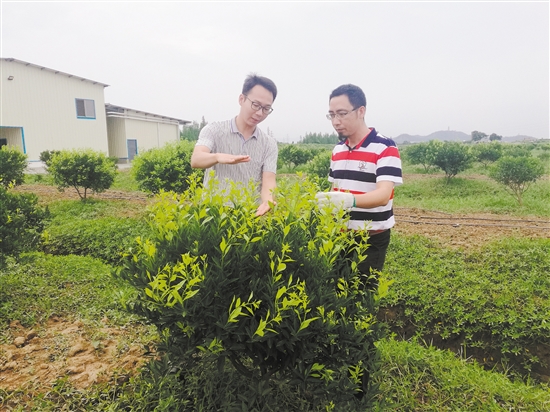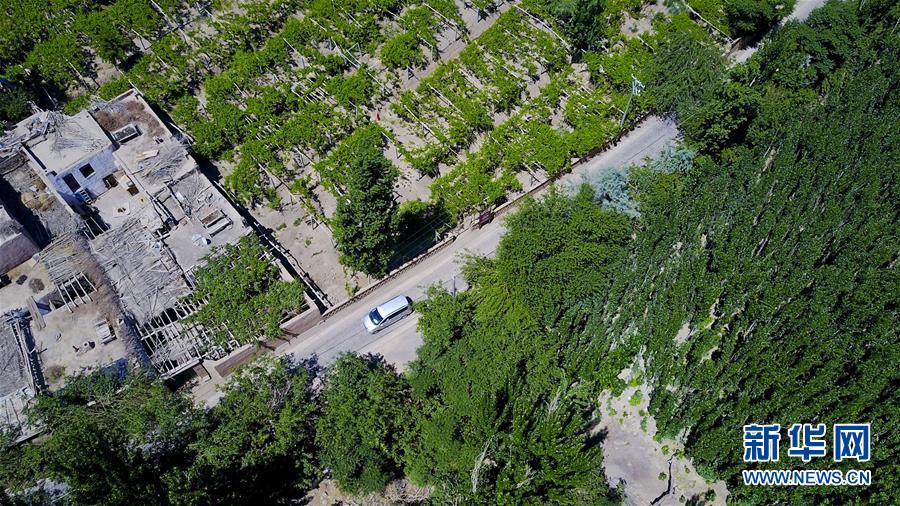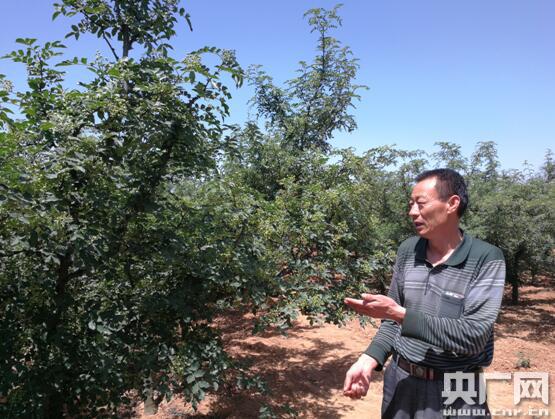Guangdong Jiangmen Xinhui tangerine peel industry explores organic planting model

Wen Weicheng hopes to introduce a healthier concept to make our Xinhui baby well, so he is exploring the planting mode of organic Xinhui mandarin.
At dusk after the new meeting the Beginning of Summer, the air was filled with a trace of enthusiasm. Out of Xinhui District of Jiangmen City, go south along Qichao Avenue to the famous Chakeng Village.
What makes Chakeng Village in Jiangmen City most proud is not only Mr. Liang Qichao, but also the authentic Xinhui mandarin. There has always been an old saying among the Xinhui folk: "wherever you can see the Xinhui bear (Yin n í) sub-tower, the Xinhui big red orange, the citrus peel is particularly fragrant, is the authentic tangerine peel." And Chakeng Village is in this excellent geographical location.
After crossing the Dadong Bridge, he soon turned to a river bank with a combination of embankments and roads, and soon entered the tail circle of Chakeng Village. In a field, neat rows of Xinhui citrus trees came into view, and the Xinhui mandarin planting base of Guangdong Wenhetang Health Industry Co., Ltd. (hereinafter referred to as "Wenhetang") arrived.
Compared with the traditional Xinhui mandarin planting base, the more than 100 mu manor in Wenhe Hall is particularly different. it is the first Xinhui citrus farm to adopt national organic product standards throughout the process.
"in July this year, we will test the fresh fruit, and it is expected to become the first Xinhui orange plantation in the country to pass the organic certification." Wen Weicheng, general manager of Wen Wetang, who accompanied him, was full of expectation.
"Organic Xinhui mandarin" is undoubtedly a new concept in Xinhui industry. According to the national standard of organic food, through the strict control of the whole process of soil cultivation, citrus seedling planting, fruit drying and skin drying, as well as warehousing and operation, we can really make a green and healthy tangerine peel.
Wen he Tang's exploration of organic Xinhui mandarin cultivation is not only an ideal for Xinhui people to eat "childhood flavor", but also a beneficial attempt for Xinhui tangerine peel industry to high-quality, high-value-added "fine agriculture".
Take nearly a year to "refine" into the best soil.
Walking into the tail circle of Chakeng Village, gurgling water, shady trees, towers stand, away from the hustle and bustle of the city, as if into a paradise.
In order to find this piece of "virgin land", Wen Weicheng took a lot of thought to find him.
"I have been looking for a suitable location since 2014, which must be at a certain distance from villages and buildings in order to maintain a relatively independent environment and not be disturbed by too much environment." Wen Weicheng introduced.
Opening the mobile phone map, we find that Zhengwei Wai is located in the lower reaches of Xinhuimu Hetan River, with Xijiang tributaries to the east and Yinzhou Lake, which is rich in water resources in the south. The hydrological spectacle of "Sanshui confluence" is definitely a natural blessed land that can not be replicated. it is also an ideal soil environment for growing the best Xinhui mandarin.
Wen Weicheng told reporters that here used to be a fish pond, the soil environment is relatively clean, and the excrement of fish and shrimp is also quite good fertilizer.
In order to grow organic Xinhui mandarin, soil quality is the primary guarantee. In strict accordance with organic standards, Wen Weicheng put his main energy on soil transformation, in accordance with the principle of "what is missing, what to make up" to improve the content of soil elements, repeated sun exposure, continuous circulation, and strive to achieve a balance of soil organic matter.
Facts have proved that the preliminary work for nearly a year has created excellent innate conditions for the growth of Xinhui mandarin and laid a solid foundation for Wenhe Hall to explore the organic cultivation of Xinhui mandarin. Through the testing of soil and irrigation water in Wenhetang citrus field by Shenzhen Co., Ltd., it is fully in line with the organic planting environment.
Let Xinhui grow up happily listening to music.
In the conversation with Wen Weicheng, the reporter found that his understanding of modern agriculture is very avant-garde, free and happy, scientific and rigorous ideas throughout his work, but also integrated into the growth of this Xinhui citrus forest.
Walking in the Xinhui manor of the mild Hall, the first feeling is that the distance between the citrus trees here is very wide.
"according to the traditional planting spacing of Xinhui mandarin, there are generally more than 80 fruit trees per mu. And we have a mu of land in strict accordance with the standard of 56 fruit trees. " Wen Weicheng explained to reporters that the purpose of creating an open planting space is to introduce more advanced management means in the future.
He said, for example, that when a citrus tree grows to 2.5 × 2.5 meters in the future, it needs enough space for mechanized operation, otherwise fruit pickers can not get in, which will affect work efficiency.
"this is a kind of preparation in advance." Wen Weicheng said that what he sees is not the yield per mu of this citrus forest, but the quality of each fruit.
What is amazing is that the more than 100 mu citrus forest in Wenhetang is developing in the direction of "fine agriculture".
"you see, the drip irrigation we use uses Israeli Letterfield technology, all of which go to the ground, and there are basically no obstacles on the road." Under the reminder of Wen Weicheng, the reporter discovered the uniqueness of this citrus forest. According to reports, the core of this set of drip irrigation technology introduced from Israel is to achieve accurate spraying of water and medicine, and can be accurately controlled in terms of dosage, distance, drop, and other indicators.
In addition, considering the sedimentary topography of Chakeng Village, Wenhetang laid down more than 2000 piles and invested heavily in the construction of its own drainage pump room and photocatalyst warehouse, all in order to provide solid hardware conditions.
Wen Weicheng said that after the optical fiber is connected here in the future, 12 Mur18 cameras will be set up to observe citrus trees from panoramic, medium and close range, and pictures and videos can also be uploaded to the website for full disclosure, so that consumers can really feel and understand the growth process of each citrus tree.
What makes the reporter feel more strange is that Wen Weicheng is particularly interested in the effect of music on the growth of crops. "every tree and grass is a living body, and the mood of the owner is likely to affect it, which is based on science." According to Wen Weicheng's plan, he will install stereos in the citrus groves so that Xinhui mandarin can thrive in a free and pleasant environment.
Do not forget the original ideal and ambition of the ideal and persistence
"these are all 2014 seedlings, which were planted in March last year and should be able to hang a small amount of fruit this year." Following Wen Weicheng to the citrus forest, his eyes were full of expectation.
Wen Weicheng picked a small citrus fruit and handed it to the reporter. He said excitedly, "the really good fruit is this taste, and the tangerine peel made in the future will be pretty enough!"
Make organic tangerine peel, Xinhui and even the whole country have no successful cases for reference, there are many difficulties, can only feel the stone across the river, one step at a time to explore.
In the Xinhui manor of Wenhe Hall, there are "three strict prohibitions" that are inviolable red lines: the use of herbicides, the use of chemical drugs, and the use of transgenic technology.
"on the one hand, we went out to learn more advanced experience from Europe and the United States, and on the other hand, we also brought in a number of technical teams from South China Agricultural University to give advice." Wen Weicheng said: organic cultivation has extremely strict restrictions on the process management of crops, and there are not many varieties to choose from in the use of drugs and fertilizers, and citrus trees encounter diseases, insect pests and other problems, so they can only be completed by physical treatment and biosphere management. if herbicides and pesticides are abused, there will always be residues, causing irrecoverable damage to the soil.
Related
- A course of planting techniques and methods on how to grow carrots
- How to plant the latest tulips?
- Is it better to pick tea in the morning or in the afternoon? When is the best time for tea to be picked? what is the third or fifth tea?
- Launch Yuanxiao Happy combination Haocha + Tea Yuan healthy Taste
- Penghu Tourism "Fireworks 20 Parade with You"
- 2022 West Lake Happiness holds "Digital Revitalization Voucher" and draws iphone13 and laptop.
- Banqiao Fuzhou social houses are designed to change start-up combined with police elimination to create a safe and livable environment
- The convenient measure of "mechanical weeding" in Xinbei has been abused and the Agriculture Bureau has imposed heavy penalties on the illegal land consolidation.
- Changgeng University Joins Hands with Four Memory Factories to Rescue Memory Talent Shortage
- The list of Taiwan's top 100 MVP managers is listed by the Director-General of the Farmers' Association of Sanxia District.



